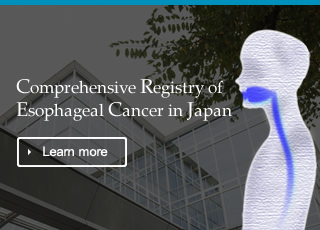About the establishment of the Japan Esophageal Society
Kaichi Isono, Chairman, Japanese Society for Esophageal Diseases
To all current and future members:
At the 56th meeting of the Japanese Society for Esophageal Diseases (held in Hiroshima), the Board of Directors, Board of Caretakers, and Board of Representatives decided that the 1st meeting of the Japan Esophageal Society should be held instead of the 57th meeting of the Japanese Society for Esophageal Diseases.
The Japanese Society for Esophageal Diseases was established in 1965. Dr. Kohmei Nakayama had an instrumental role in its founding. During the next approximately 37 years, the Japanese Society for Esophageal Diseases contributed substantially to improving the outcome of treatment for esophageal diseases. Such improvement was enabled by the continuous, sincere efforts of many of our senior colleagues. The history of our society is intertwined with many precious memories and anecdotes.
Esophageal diseases are currently treated at nearly all hospitals. The outcomes of treatment are uniformly excellent. Many experts in surgery, radiology, immunochemotherapy, and basic research have played important parts in the improvement of treatment outcomes. Recent studies have shown that the outcomes of radiotherapy and chemotherapy are comparable to that of surgery in patients with esophageal cancer. Cytological and genetic research will gradually play increasingly important roles in the future.
The future development of medicine requires individuals with unique personalities and research executed at well-equipped centers. Further progress in the treatment of esophageal diseases requires that experts in radiotherapy, immunochemotherapy, and basic research cooperate on an equal footing with surgeons.
For the past 2 or 3 years, I felt the need to establish a new society and therefore promote the development of medicine in the 21st century. I had discussed the idea with some members of the Society. The prime reason for not immediately deciding to start a new society was that the financial burden would be shifted to many young researchers who become individual members. At former meetings, I discussed this problem with several Directors of the previous society who are actively involved in the education and training of the next generation of specialists. On hearing their opinions, I became firmly convinced that the Japanese Society for Esophageal Diseases should evolve into the Japan Esophageal Society, and I received their agreement.
We hope that you understand the background and reasons for the establishment of the Japan Esophageal Society. We further hope that we can actively work together to promote the future development of the Society. We encourage membership among interested individuals.
Sincerely yours,
Chairman, Japanese Society for Esophageal Diseases
Honorary Chairman, Japan Esophageal Society Kaichi Isono

